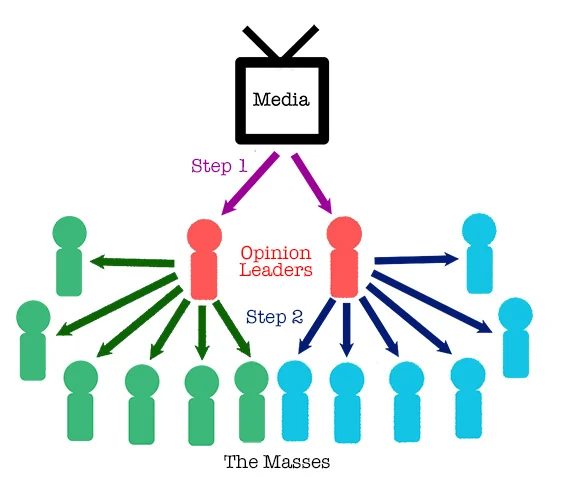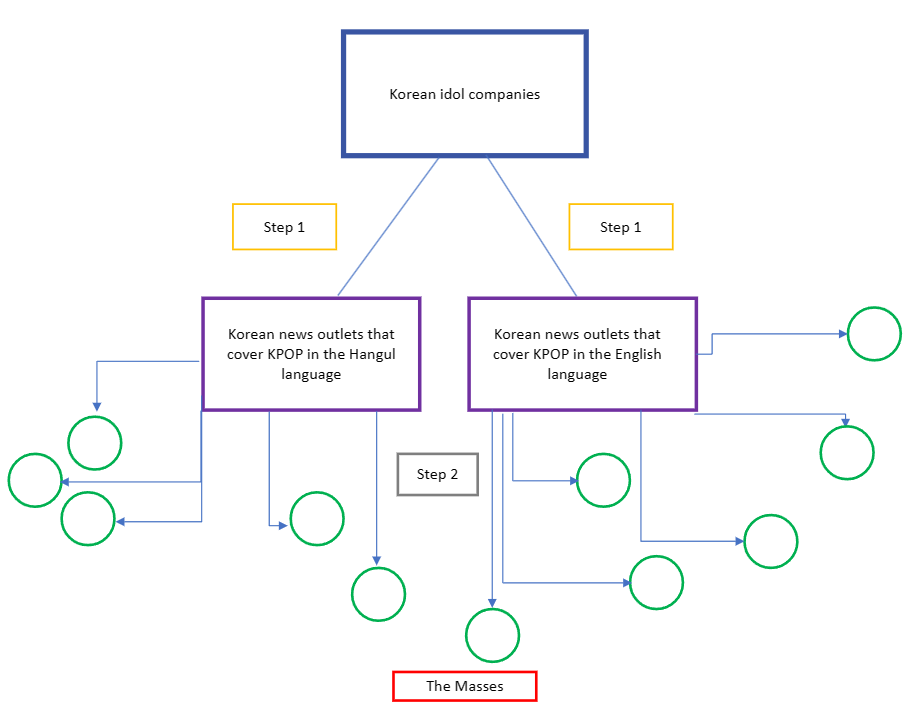By Sarah Munsi
The ‘Two Step Flow Theory‘ puts forward this motive that the media does not have a head-on forward effect on the entire media audience but is passed on to opinion leaders who then take in this information and dump it onto the immediate social groups that can be affected by this information. This hypothesis brings this opinion that the opinion leaders are the main channel for political information.

This theory was introduced by Hazel Gaudet, Bernard Berelson and Paul Lazarsfeld all the way back in 1948 with the collaboration book titled ‘The People’s Choice’. It showed their results gained from the analysis of the decision-making processes of voters during the 1940s election for the President of the United States. From their results, they found out that the majority of the voters from the 1940 election had received information about the candidates not directly from the media but of word-of-mouth (others who have knowledge of it via the newspaper). In their book, they discussed that content on mass media gets to highly active media users first (the opinion leaders) who then interpret and change the meaning of the content to less-active consumers of mass media (the masses, as shown in the image). An early interest of the theory started with Elihu Katz, an American sociologist, who Lazarsfeld later collaborated with on the book titled ‘Personal Influence’, at the Bureau of Applied Social Research at Columbia University and Katz called the original study a “major turning point in the conceptualisation of the process of mass communication”.
The introduction of this model begun a shift in the mass communication theory by questioning the model called hypodermic needle, which is a theory that suggests that media messages are understood perfectly by the audience. Research done by Lazarsfeld showed that around 5% of the population had changed their voting preference because of first-hand media consumption and factors such as communication with family, friends and colleagues was able to have made more predictions of a voting pattern rather than an exposure to media. This was then developed by Joseph Klapper. This went on and on with arguments thrown across.
We can say, according to the theorists, that journalists are one example of opinion leaders as they feed off what has been said by the likes of the BBC, ITV, Channel 4, whoever they work for and they reinterpret what has been said and knowledge it off to consumers of media via social media and online, TV, newspapers, any publication of journalism.
Now you’re wondering why I’m using KPOP as my main example?
Well, I was introduced to KPOP by my friend in secondary school. One day, she showed me a music video that was released on the day, I watched it and I was hooked, without knowing anything at all about the language, the cuisine, the traditional outfits. I just loved it, there and then. I was drawn to it by my friend recommending it to me but how did she get to know about KPOP? I don’t know. She comes from China and that can be a factor in how she got to know about it.
My diagram shows that the Korean companies are at the top because they are in charge of the idols at their company and they make sure that they say the right thing to not only make themselves look good but possibly the fandom of that particular idol as well. Let’s say, for example, that an idol gets involved in a bullying scandal, the first people that should know about that are the company. They then release a statement explaining the situation and conclude that the rumours are not true and that people should stop before they take legal action. Media outlets see that and make articles on it and release them to the general public. Those that will read it are either fans of that person/group or people that just take an interest in KPOP.
Around 2019 – 2021, there was a whole array of rumours about idols being bullies back in their former years and unfortunately, some have had to make the decision of leaving their group or not being in the spotlight anymore. An example that I personally felt sad about was Seo Soojin from (G)-Idle, who rose to fame after debuting in 2018. She was a prominent member in the group and in 2021, she left the group. It apparently turned out to not be true, as a classmate debunked any rumours. We don’t know whether her decision to leave was her own or the company’s but it is in the past and everyone has moved on from it (not me) and are doing really well, her former group are now on tour promoting their first full English album. It has actually been reported that she will be making her solo debut so that makes me really happy.
News travels really fast in the fandom, there will never be news that someone did not know about. There is room for opinion leaders to express their own opinion but there is a high doubt that will happen. I don’t want to believe what has been said by the media but it’s hard not to, where else am I going to get my information from? Information is coming back and forth and it can get overwhelming sometimes which frustrates me. Everyone at this point can be lying but what can we do to change the narrative of believing everything you see or hear?



I think your example is amazing, that KPOP industry can be seen as a small society and your example reflects the truth about how the two-step flow theory works. one thing I am interested in is have you tried to ignore the Information from the opinion leaders but just focus on idols’ work? I think that might be better since you are just enjoying their songs. Sometimes I also feel bored about what other people say, if I like somebody because of her/his talent, maybe I just don’t care what others say.
I love the title that you chose, which is really eye-catching. From your post, I have learned about the main concept of the theory and the book Paul, Bernard, and Hazel have written. The K-pop example is really attractive, and the flow chart that you have drawn is really interesting.
Here is a detailed explanation of two -flow theory model, especially introducing authors who came up with the theory. I was attracted by background story. And also, you explain well about concept of the theory with good pictures. It is a good example that your experience is applied to theory. But there is no clear point that who is opinion leaders, whether your friend or Korean companies or the mass media, influence your preference in KPOP because opinion leaders play a role in the theory, and you should talk more about them. And also, is the theory perfect? Is it old or without any issues?
I have found the title of your post very interesting, i feel like it is a combination of both humor and seriousness. I also like how. from the start you explained what two-step flow theory is. I think that including diagrams was also a great choice! I like how your first diagram of the theory is a basic one, but your second one is more specific, complementing your example. However, I think that you can improve the post by making the text in the middle, about where the theory comes from and how it affected the world a bit more summarised, as it can make a reader feel confused because up until that point they haven’t read about K-pop yet. I also think that it can be mentioned that sometimes the role of mass media in two-step flow theory isn’t played only by the companies, like with the example of bullying scandal. I thought that the first information came not only from the companies but also from the alleged victims of the scandals! But other than that I found myself enjoying reading the post and I look forward to reading more posts written by you!
I agree with you very much, it is difficult to distinguish right from wrong when the information on the Internet is mixed together, some facts may be distorted by some opinion leaders of marketing numbers, and what we have to do is to distinguish carefully, it is best not to follow the trend. Follow your heart.
I like your title it’s interesting and makes me wonder why you regret liking K-pop.
In brackets on my title, it says I’m lying. I don’t think I’ll ever fall out of love with KPOP, it’s introduced me to a a new language, music and people. It’s just the trouble of knowing what’s true and not, who’s right and who’s wrong and what to do with the information once you’ve read it.